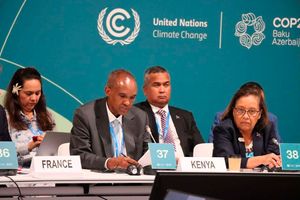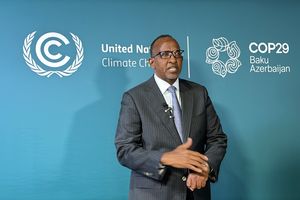Africa demands reform of 'unjust' global financial system

Delegates leave a hall after listening to statements from various speakers at COP29 in Baku, Azerbaijan on November 19, 2024. Africa’s push for radical changes to global financial systems emerges as international climate finance negotiations remain deadlocked over funding mechanisms for developing nations.
What you need to know:
- Though rich in resources—controlling approximately 65 per cent of the world's uncultivated arable land, 30 per cent of global mineral reserves, and significant energy deposits—Africa struggles to translate these assets into sustainable development.
African organisations have launched a controversial campaign demanding radical changes to global financial systems they say have strangled the continent's development despite its abundant natural resources.
The initiative, branded as the "Climate and Economic Justice Campaign," comes amid growing frustration among African leaders over persistent debt burdens that divert resources from climate action and essential services.
Spearheaded by the Global Call to Action Against Poverty and the Pan African Climate Justice Alliance (PACJA), the campaign emerges as international climate finance negotiations remain deadlocked over funding mechanisms for developing nations.
Critics question whether international lenders like the World Bank and IMF are part of the problem rather than the solution when it comes to Africa's economic challenges.
"For decades, we have called for a reduction in the dominance of the IMF and the World Bank in shaping global economic governance, precisely because these institutions are entangled in a fundamental conflict of interest. They remain primarily accountable to creditors and funders, not to the countries they purport to support," said Jackson Braganza, executive director of African Forum and Network on Debt and Development.
Debt distress
The campaign's timing coincides with rising debt distress across several African economies, with Covid-19 pandemic recovery efforts and climate shocks pushing many nations toward potential defaults.
Though rich in resources—controlling approximately 65 per cent of the world's uncultivated arable land, 30 per cent of global mineral reserves, and significant energy deposits—Africa struggles to translate these assets into sustainable development.
Campaign leaders argue this disconnect stems from structural injustices in global financial architecture rather than domestic governance challenges.
"It is profoundly unjust that Africans continue to bear the cost of crises they did not create. This historical imbalance must be acknowledged and redressed," said Augustine Ndjamshi, chairperson of PACJA's Political and Technical Committee Board, though he offered few specifics on how exactly such redress should be structured.
The new campaign advocates for controversial measures, including debt cancellation and reparations, positions that have historically faced resistance from creditor nations and international financial institutions.
Martha Bekele of DevTransform took issue with the current climate finance models, saying they perpetuate dependency rather than enabling transformation.
"We don't just need to tweak the global financial architecture—we need an overhaul that delivers real benefits to African people. Climate justice demands radical solutions, not performative gestures," Bekele insisted, demanding that "climate finance should be 100 per cent grant-based, especially when it comes to adaptation for sub-Saharan Africa and Small Island Developing States."
Her assessment reflects deepening skepticism among African civil societies toward climate finance packages that often come as loans rather than grants, potentially worsening debt burdens for already constrained economies.
Meanwhile, the African Development Bank has taken a more pragmatic stance, focusing on how the continent might better leverage its natural resources in emerging green technology supply chains.
"Africa is rich in minerals, many of which remain undiscovered. What makes a mineral critical is its application—without a use, it's just another rock but once its utility is established, it becomes valuable," noted Dr Olufonso Somorin, principal regional officer at the bank.
Dr Somorin emphasised strategic partnerships over confrontation: "We are in a new world order and so we must choose those that choose us, we cannot continue to follow those that are not aligned with us."
Whether the campaign will gain traction in international forums remains unclear. Previous African-led initiatives demanding structural economic reforms have faced significant resistance from wealthy nations that dominate global financial governance.
Dr Mithika Mwenda, executive director at PACJA, framed the stakes in stark terms: "The debt crisis we face is not an abstract fiscal concern; it is a humanitarian emergency. Across the Global South, nations are diverting more resources to servicing often illegitimate external debts than investing in essential public services such as health and education."
While the campaign links economic justice directly to climate action through its focus on debt relief as a prerequisite for climate resilience, skeptics note that improving domestic resource mobilisation and governance would also be essential components of any sustainable solution.
The campaign aligns with broader continental initiatives including Africa's Agenda 2063, but faces challenges in bridging divisions between African governments that hold varying positions on climate finance and debt management.
According to PACJA, this initiative represents just the beginning of a broader effort to reshape global economic relationships as climate negotiations intensify ahead of the next major United Nations climate conference.


